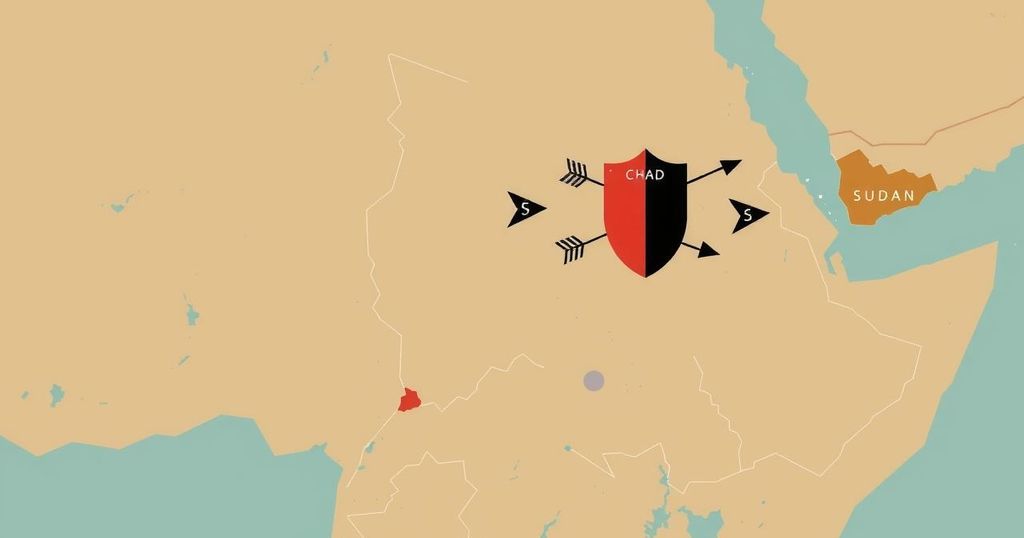Chad Denounces Sudan’s Threats, Emphasizing the Need for Peaceful Dialogue

Chad condemns Sudan’s military threats as a declaration of war, vowing to respond to any territorial aggression. Sudan’s accusations against the UAE regarding arms supplies to RSF intensify regional tensions. The RSF’s recent military gains in Darfur and dire humanitarian conditions exacerbate the ongoing civil conflict, underscoring the urgent need for dialogue.
Chad has expressed strong condemnation of threats from Sudanese Lt-Gen Yasir al-Atta, labeling them as a “declaration of war.” The foreign ministry’s statement emphasized that should any extent of Chadian territory be threatened, a response in accordance with international law would be enacted. This assertion follows claims by General al-Atta that the United Arab Emirates (UAE) is utilizing Chad’s airports to supply weapons to the paramilitary group, Rapid Support Forces (RSF).
The Sudanese army has consistently accused the UAE of aiding the RSF during the protracted civil war, which has become a severe humanitarian crisis. Notably, UN experts have deemed the allegations of UAE’s weapon smuggling through Chad as credible; however, the UAE maintains that these charges are unfounded. General al-Atta’s remarks coincide with Sudan’s recent decision to escalate the issue to the International Court of Justice (ICJ) against the UAE due to its alleged backing of the RSF.
During a memorial service for an army officer recently killed in a drone attack by the RSF, General al-Atta characterized Chad’s airports as “legitimate targets” and warned that “retaliatory action” would extend to the UAE, South Sudan, and President Mahamat Déby of Chad. South Sudan has also faced accusations of supporting the RSF, a claim it denies. General al-Atta emphasized the seriousness of his warnings, asserting, “We know what we are saying, and our words are not a joke at all.”
The Sudanese army’s comments reveal their increasing dissatisfaction with Chad and other neighboring nations, which they accuse of facilitating supplies to the RSF. In December, Sudan’s defense ministry indicated that advanced weaponry, including strategic drones capable of carrying guided missiles, had been supplied. While Chad has attempted to maintain a neutral stance, rising tensions reflect the escalating regional instability stemming from Sudan’s ongoing civil conflict, complicated further by foreign involvement.
Chad articulated that General al-Atta should cease issuing reckless threats and urged for an immediate cessation of hostilities, emphasizing the necessity for constructive dialogue to achieve a peaceful resolution. Moreover, Chad is home to a large number of Sudanese refugees escaping the conflict in Darfur, which is predominantly under RSF control.
The harsh exchange of threats coincided with the RSF’s announcement of their seizure of the al-Malha town in Darfur, strategically located along critical trade routes to Chad and Libya, and close to el-Fasher, the last state capital still under army control. The RSF claimed to have surrounded the area, reporting significant casualties among those opposing them, while also asserting their determination to secure peace for the Sudanese people. Reports from local activists indicated road closures, restrictions on movement, and humanitarian challenges following the RSF takeover.
Humanitarian coordinators reported dire conditions in al-Malha after the RSF’s control, with shortages of water, looted markets, and damaged healthcare infrastructure. Estimates suggest that fatalities from RSF activity may range between 35 and 48. Many survivors have fled to nearby villages, facing ongoing shortages of food and water, while those remaining, including various ethnic groups targeted by the RSF, are enduring further violence and destruction.
Analysts observe that the RSF appears determined to consolidate its power in Darfur amidst significant gains made by the Sudanese army elsewhere in the country. The RSF’s leader, Gen Mohamed Hamdan Dagalo, has pledged to persist in the fight, indicating that while they remain dispersed across the capital, the army has made strategic advances in controlling critical infrastructure. Yet, there are concerns regarding the potential for a de-facto partition, as both factions seem poised to entrench their respective zones of influence as the conflict continues to unfold.
In summary, Chad’s condemnation of Sudan’s military threats underscores a heightened tension in the region amidst the ongoing conflict. The Sudanese army’s accusations against the UAE and Chad of supporting the RSF, paired with the recent military engagements, highlight the potential for escalating violence and humanitarian crises. The calls for ceasefire and dialogue indicate a desire for resolution but reflect the complexities involved given the regional stakes and external influences in the conflict.
Original Source: www.bbc.com








